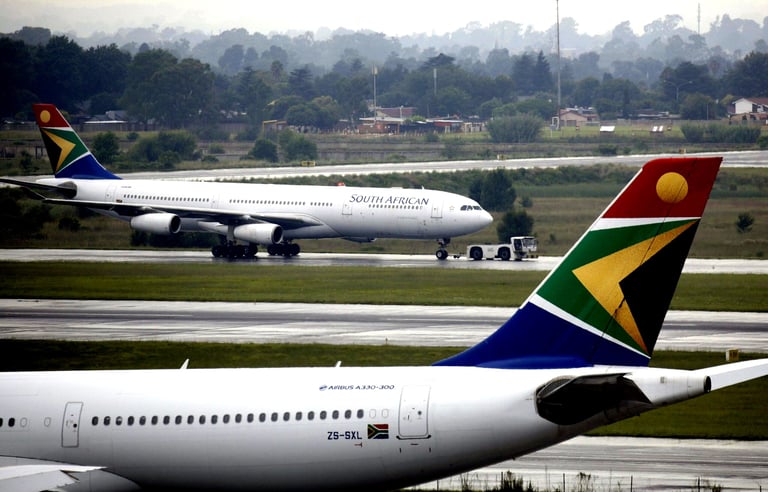ACSA’s R21.7bn Transformation: Revolutionizing South Africa’s Airports by 2027
Airports Company South Africa’s (ACSA) R21.7 billion infrastructure development programme, set for completion between 2025 and 2027, aimed at enhancing the aviation sector’s growth, safety, and operational resilience. The initiative includes upgrades to terminal facilities, passenger loading bridges, uninterrupted power supply systems, jet fuel infrastructure, and fire safety measures across ACSA’s nine major airports, including OR Tambo, Cape Town, and King Shaka International. With a focus on improving passenger comfort, hygiene, and operational efficiency, ACSA is addressing post-COVID challenges while supporting economic growth through job creation and tourism.
AVIATIONAVIATION PROJECTSLOGISTICS
Patricia Jacobs
6/26/20253 min read


ACSA Forges Ahead with R21.7bn Infrastructure Development Projects
The Airports Company South Africa (ACSA) is advancing an ambitious R21.7 billion infrastructure development programme, set to be delivered between 2025 and 2027, aimed at bolstering the aviation sector’s long-term growth and operational resilience. ACSA CEO Mpumi Mpofu recently emphasized the strategic importance of these projects, stating, “This programme is a strong signal of ACSA’s recovery following the COVID-19 pandemic, reflecting our return to financial sustainability and our ability to reinvest in critical infrastructure that will serve the aviation industry and the broader economy for years to come.”
Spanning ACSA’s nine major airports, including OR Tambo International, Cape Town International, and King Shaka International, the projects are designed to enhance passenger comfort, safety, and airport hygiene while modernizing infrastructure to meet growing demand. With passenger volumes reaching 27.2 million in the 2023/24 financial year—a 91% recovery from pre-COVID levels—these upgrades are critical to maintaining South Africa’s position as a leading aviation hub in Africa.
The infrastructure improvements target high-impact utilities and operational systems, including:
Terminal and Roofing Works: Upgrades include heating, ventilation, and air conditioning (HVAC) enhancements, terminal roof waterproofing, and sprinkler system replacements to ensure passenger comfort and safety across all seasons. At OR Tambo International Airport, a flagship project involves the phased refurbishment of ablution facilities, covering male, female, baby-change, and accessible amenities, with completion expected by December 2025. Cape Town International Airport will see a reconfiguration of its domestic arrivals terminal, including expanded meet-and-greet areas, baggage claim zones, and retail spaces, alongside a R3 billion runway realignment project to increase aircraft capacity by 50%.
Passenger Loading Bridges (PLBs): Structural repairs and system upgrades, including canopy cover replacements and control system overhauls, are underway at multiple airports. Key milestones are targeted for completion between November 2025 and 2026, ensuring smoother boarding and disembarking processes for passengers.
Uninterrupted Power Supply (UPS) Systems: A phased replacement of UPS units across critical operational points is scheduled for completion by 2026. These upgrades address South Africa’s power challenges, ensuring energy resilience during outages. For instance, following a substation failure at Cape Town International in January 2024, ACSA installed additional backup generators and implemented load reduction protocols to enhance redundancy.
Jet Fuel Systems: ACSA is addressing fuel supply reliability, particularly at OR Tambo International, with a new 20-inch Jet A1 fuel feeder pipeline set to replace the existing underground line by March 2026. The implementation of Jet Fuel Redundancy Phase 1 will boost supply continuity, allowing the airport to maintain operations for up to 15 days during disruptions, compared to the current 10-day contingency. A bypass installation around a faulty fuel valve, which caused a four-hour disruption in December 2024, is expected to be completed by February 2025.
Fire Systems and Infrastructure: Upgrades to sprinkler systems, fire escapes, and airfield perimeter lights are enhancing safety compliance across ACSA’s airports. These improvements are critical for high-traffic areas and sensitive operational zones, ensuring adherence to international aviation safety standards.
Beyond maintenance, ACSA is undertaking significant capacity expansion projects. At OR Tambo International, a new R5.6 billion Mid-Field Cargo Terminal is under construction to meet growing cargo demand, alongside six new bussing gates and expanded retail and lounge areas. King Shaka International Airport will see the development of a hotel and terminal expansion by 2027/28, while King Phalo Airport in the Eastern Cape will undergo departure lounge expansions and security checkpoint relocations. Chief Dawid Stuurman and George Airports are also slated for terminal expansions to accommodate rising passenger numbers.
ACSA is collaborating closely with government, airlines, and commercial stakeholders to minimize disruptions during project implementation. This partnership approach is vital, as ACSA’s airports are national key points, requiring stringent security measures. However, challenges such as the “construction mafia” have prompted ACSA to adopt secrecy around project costs to prevent extortion and disruptions. CEO Mpumi Mpofu noted, “The minute ACSA mentions a multi-billion project, it attracts the type of attention we don’t need,” highlighting proactive measures to safeguard the programme.
Financially, ACSA has demonstrated resilience, declaring a dividend of R816 million in 2024, comprising R768 million for preference shares and R48 million for ordinary shares, with the government holding a 75% stake. This marks a significant recovery from a R466 million loss in the prior financial year, with a profit after tax of R472 million in 2023/24 and over R1 billion before tax by Q3 2025. The R21.7 billion investment, the largest since the 2010 FIFA World Cup, underscores ACSA’s commitment to operational excellence and global competitiveness.
The programme also supports economic growth by creating jobs and boosting tourism. The upgrades are expected to enhance intra-African connectivity and international arrivals, benefiting travel agents and tourism professionals. By addressing infrastructure shortcomings identified post-COVID, such as outdated fuel systems and people movers, ACSA is future-proofing its airports to handle projected passenger growth to pre-COVID levels of 32.5 million annually by 2026.
ACSA’s R21.7 billion infrastructure initiative is a transformative step toward modernizing South Africa’s aviation sector, ensuring safer, cleaner, and more efficient airports that enhance the passenger experience and solidify the country’s position as a global aviation leader.
Future
© 2025. All rights reserved.


